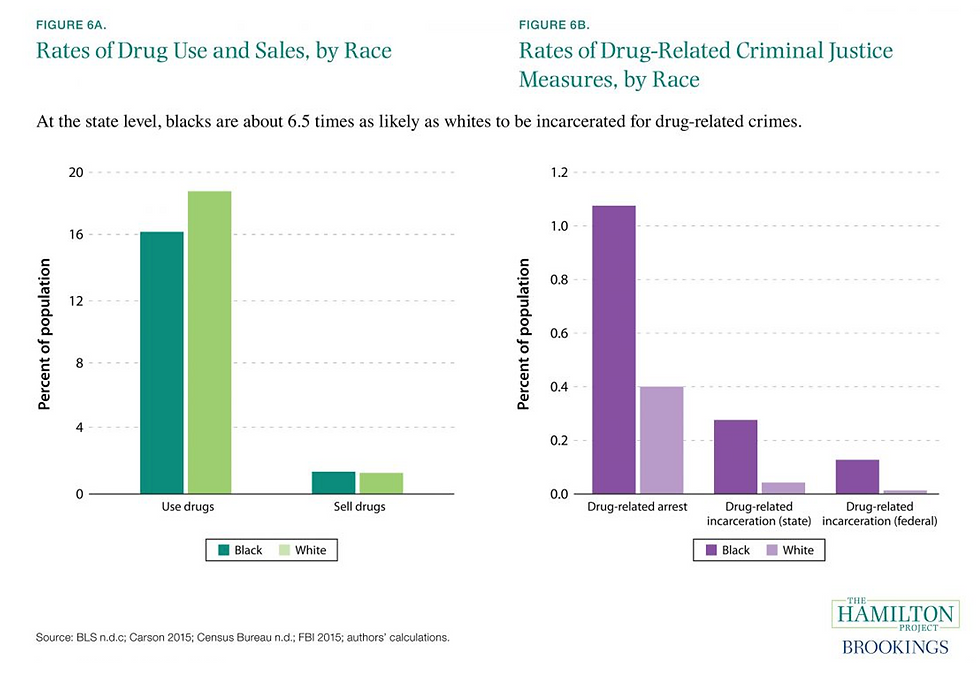How drug policies in America perpetuated systemic racism
- Anastasia Humpert-Riches
- May 10, 2021
- 3 min read
Updated: Jan 8, 2023

Richard Nixon was the 37th president of the United states of America and he hated drugs. In the 1970s Nixon declared that drugs were “Public enemy number one” and vowed to fight against drug consumption in the united states. This was in response to the rise of drugs use in the 1960s and the fact that they became a symbol of rebellion, social upheaval and political decent. Drugs such as marijuana and cocaine were largely attached to minority groups such as African Americans and Latino immigrants, not only that but Hippies were known to partake, and they were protesting the Vietnam war. But why would he create drug laws as a rebuttal to communities he disliked?
John Ehrlichman, former council for President Nixon, stated in an interview i“The Nixon campaign in 1968, and the Nixon White House after that, had two enemies: the antiwar left and black people. You understand what I’m saying? We knew we couldn’t make it illegal to be either against the war or black, but by getting the public to associate the hippies with marijuana and blacks with heroin, and then criminalizing both heavily, we could disrupt those communities. We could arrest their leaders, raid their homes, break up their meetings, and vilify them night after night on the evening news. Did we know we were lying about the drugs? Of course we did.”This statement should be taken with a grain of salt as many historians argue that blaming the whole war on drugs on racism and a hatred for hippies is an oversimplification of the issue
Legislature surrounding drugs and prison sentences has still been criticized however, for what could be seen as racism. In 1986 under President Reagan congress passed a new act, this act was called the Anti-Drugs Abuse act which created minimum prison sentences for certain drug offences. It was criticized due to the fact that it gave longer prison sentences to the use of crack cocaine (used most often by African Americans) than powder cocaine (used mostly by white Americans). 5g of crack cocaine was an immediate 5-year prison sentenced but it took 500g of powder cocaine to receive the same sentence. There have also been studies conducted in which it was found that black Americans were disproportionately prosecuted on suspicion of drug use and if found guilty received heavier prison sentences. (Race, drugs, and Law Enforcement in the United States, 2009)

So how is this applicable today? There are an estimated 40,000 people who are imprisoned for cannabis related charges (even though many states have legalized personal use of marijuana and billionaires are profiting from a new market). Hundreds of thousands get arrested but do not go to jail, this still stays on their record for years which makes it harder to find jobs, apply for loans or housing. This could potentially end up crippling entire communities. Due to the fact that African Americans are 4x as likely to get arrested for use of marijuana than white Americans. These statistics are frightening and show how even in areas where you would think that most people would be incarcerated for drug possession the reality is that black Americans are judged more harshly.
The war on drugs should be colour-blind instead it chooses too disproportionately go after Black Americans which leads to even more problems for them in the future. Even worse is that the prisons in the united states, instead of locking away violent and dangerous people, are locking away people for non-violent drug related crimes (United States - Punishment and Prejudice: Racial Disparities in the War on Drugs, 2002). While it is important for there to be control on drugs and to work on public health, this should not override American citizen’s right to equal protection of laws and racial equality.
Anastasia Year 12





Comments